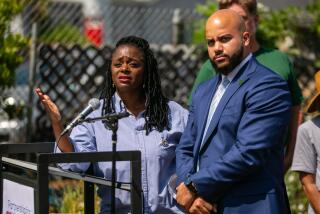Left, Right Join in Medical Pot Fight
- Share via
WASHINGTON — By their own admission, the medicinal marijuana advocates who gathered Wednesday in a basement room of the Capitol made up a bizarre partnership. And they agreed that their cause--getting the federal government to butt out of states’ laws on the use of marijuana for medical purposes--was pretty much hopeless right now.
But a former aide to President Reagan and several members of Congress--including an openly gay, die-hard liberal, a onetime Libertarian presidential candidate and a Southern California Republican known for wearing puka shells and surfing--said the time had come to push the matter with a reluctant Legislature.
“Nine states have decided to allow physicians to prescribe medical marijuana,” said Rep. Barney Frank (D-Mass.), one of the bipartisan authors of HR 2592, which was introduced a year ago but has yet to make it out of the House Energy and Commerce Committee to the floor for debate. “What our bill does is to say [that] in those states, there will be no federal prohibition on such use.”
Eight Western states--Alaska, Arizona, California, Colorado, Hawaii, Nevada, Oregon and Washington--and Maine have laws letting doctors to prescribe marijuana to patients suffering from illnesses such as glaucoma, multiple sclerosis, AIDS and cancer. Proponents of medical marijuana use contend that for these patients, it relieves a variety of symptoms--including pain, nausea and loss of appetite--with minimal side effects.
But state laws permitting medical marijuana clash with federal regulation of illegal narcotics. That has resulted in federal prosecutions of individuals who, under state law, have committed no crime.
In its first review of a medical marijuana initiative passed by state voters in 1996, the California Supreme Court last week ruled unanimously that residents who grow marijuana for personal medical use are protected from state prosecution if they have their doctor’s approval. However, the U.S. Supreme Court, considering the California initiative last year, ruled that marijuana offered no “medical benefits worthy of exception” to federal anti-drug laws.
Rep. Ron Paul (R-Texas)--the former Libertarian presidential candidate--called the denial of access to marijuana to suffering patients “criminal.”
“Where are the compassionate conservatives today? They’re not here, and they should be,” Paul said, arguing that decriminalizing marijuana, which he dubbed a “so-called illegal drug,” would be restoring rights lost to federal oversight in the early 1900s.
“Let’s get over some of the stereotypes and hangovers from the ‘60s,” said Rep. Dana Rohrabacher of Huntington Beach--the only California Republican to sign on to the bill so far.
Backers of the bill emphasized that its scope was very narrow--to stop interference by federal law enforcement agencies in the distribution of medical marijuana where states allow it. The legislation, they said, was not meant to open the door to broader legalization of pot, although some boosters of the bill, such as the National Organization for the Reform of Marijuana Laws, have pushed for such change.
Lyn Nofziger, an aide to Reagan in both Sacramento and Washington, spoke of his daughter’s painful death from cancer a decade ago. Her suffering, he said, was relieved only by her family’s illicit acquisition of marijuana for her use. The experience turned him into a staunch supporter of the medicinal use of the drug, he added.
Marijuana “did not save her life, nor did we think it would,” said Nofziger, 78. “But it made a portion of the last weeks of her life more bearable to her and her family.
“An administration who claimed to be compassionate and conservative should support this legislation. People are being denied help by others who simply don’t give a damn.”
Jim Miller of Cherry Hill, N.J.--whose wife, Cheryl, 56, was diagnosed with multiple sclerosis in 1971--pleaded with lawmakers to at least allow the issue to come up for debate. It was his wife’s ninth trip to the Capitol to address the issue and likely her last, because of her condition, Miller said.
“We’re tired of hit-and-run from legislators who say marijuana is bad and won’t listen,” Miller said. “It’s too late for Cheryl--but there are a lot of other Cheryls out there, and it’s not too late for them.”
More to Read
Get the L.A. Times Politics newsletter
Deeply reported insights into legislation, politics and policy from Sacramento, Washington and beyond. In your inbox twice per week.
You may occasionally receive promotional content from the Los Angeles Times.











